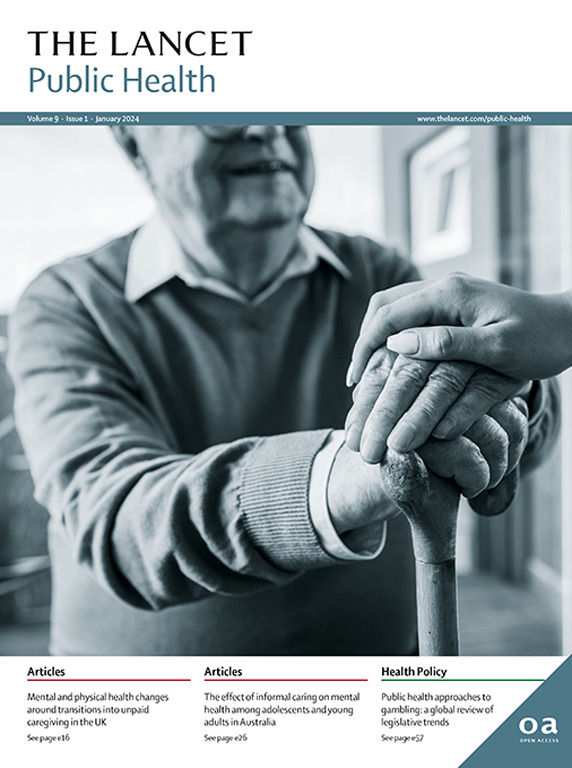在西澳大利亚偏远地区的土著和托雷斯海峡岛民妇女中,自我收集子宫颈筛查方法、即时HPV检测和当日阴道镜检查(预防项目):一项实施研究
IF 25.2
1区 医学
Q1 PUBLIC, ENVIRONMENTAL & OCCUPATIONAL HEALTH
引用次数: 0
摘要
在偏远地区,土著和托雷斯海峡岛民妇女在癌症筛查方面可能面临很大障碍。为了支持世卫组织消除宫颈癌的目标,我们对西澳大利亚偏远地区土著和托雷斯海峡岛民妇女的自我收集、即时人乳头瘤病毒(HPV)检测和当日专家评估相结合的新型筛查方法进行了评估。方法:我们开发了一种筛查方法,对自采样本进行即时HPV检测,当日获得结果并立即进行专家评估。这项实施研究被送到六个偏远的金伯利土著社区,并评估临床结果和参与者满意度。该方法在2022年9月1日至12月31日期间作为常规妇科外展护理的一部分实施,宫颈检查结果的随访持续到2023年3月31日。年龄在25-74岁的妇女,如果她们被确定为土著和/或托雷斯海峡岛民,无症状,宫颈筛查到期或过期(或以前没有进行过HPV筛查试验),并且居住在偏远社区,则有资格参加本研究。本研究的主要目的是评估即时检测和当日随访方法是否增加了西澳大利亚偏远地区未接受筛查和未接受筛查的土著和托雷斯海峡岛民妇女的宫颈筛查参与。在被确定为符合条件的844名女性中,303名(36%)被直接邀请参加。在4个月内,108名妇女参与了干预,应答率为36%。在参与者中,108人中有22人(21%)检测出致癌HPV阳性,其中21人(95%)完成了当天的阴道镜评估。未发现高级别宫颈异常。参与者报告了对自我收集快速结果和当日专家访问的高度满意度,107人(99%)表示愿意向其他人推荐这种方法。通过成功的社区参与和宣传,我们展示了将便携式、当日子宫颈筛查和后续护理纳入偏远医疗机构的可行性。这些发现为决策者提供了宝贵的见解和机会,以增加妇女参与筛查规划,特别是在地理上偏远的地区。资助:卫生部澳大利亚土著居民健康方案新出现的优先事项补助金、澳大利亚妇科癌症基金会的辛迪·沙利文奖学金、玛丽·简基金会以及国家健康和医学研究委员会。本文章由计算机程序翻译,如有差异,请以英文原文为准。
Cervical screening approach of self-collection, point-of-care HPV testing, and same-day colposcopy among Aboriginal and Torres Strait Islander women in remote Western Australia (the PREVENT Project): an implementation study
Background
Aboriginal and Torres Strait Islander women can face substantial cancer screening barriers in remote areas. To support WHO cervical cancer elimination targets, we evaluated a novel screening approach integrating self-collection, point-of-care human papillomavirus (HPV) testing, and same-day specialist assessment for Aboriginal and Torres Strait Islander women in remote Western Australia.Methods
We developed a screening approach using point-of-care HPV testing on self-collected samples with same-day results and immediate specialist assessment. This implementation study was delivered to six remote Kimberley Aboriginal communities and assessed clinical outcomes and participant satisfaction. The approach was implemented as part of routine outreach gynaecology care between Sept 1 and Dec 31, 2022, with follow-up for cervical test results continuing up to March 31, 2023. Women aged 25–74 years were eligible for this study if they identified as an Aboriginal and/or Torres Strait Islander, were asymptomatic, were due or overdue for cervical screening (or had not had a previous HPV screening test), and were residing in a remote community. The primary objective of this study was to assess whether a point-of-care testing and same-day follow-up approach increased participation in cervical screening among under-screened and never-screened Aboriginal and Torres Strait Islander women in remote Western Australia.Findings
Of the 844 women identified as eligible, 303 (36%) were directly invited to participate. Within 4 months, 108 women participated in the intervention, a 36% response rate. Among participants, 22 (21%) of 108 tested positive for oncogenic HPV, with 21 (95%) of these completing the same-day colposcopic assessment. No high-grade cervical abnormalities were detected. Participants reported high satisfaction with self-collection rapid results and same-day specialist access, with 107 (99%) indicating a willingness to recommend the approach to others.Interpretation
We showed the feasibility of integrating portable, same-day cervical screening and follow-up care into remote health-care settings, achieved through successful community engagement and advocacy. These findings offer valuable insights for policy makers and opportunities to increase women's participation in screening programmes, particularly in geographically remote areas.Funding
Department of Health's Indigenous Australians' Health Programme Emerging Priorities Grant, Australian Gynaecological Cancer Foundation's Cindy Sullivan Fellowship, Mary Jane Foundation, and National Health and Medical Research Council.求助全文
通过发布文献求助,成功后即可免费获取论文全文。
去求助
来源期刊

Lancet Public Health
Medicine-Public Health, Environmental and Occupational Health
CiteScore
55.60
自引率
0.80%
发文量
305
审稿时长
8 weeks
期刊介绍:
The Lancet Public Health is committed to tackling the most pressing issues across all aspects of public health. We have a strong commitment to using science to improve health equity and social justice. In line with the values and vision of The Lancet, we take a broad and inclusive approach to public health and are interested in interdisciplinary research.
We publish a range of content types that can advance public health policies and outcomes. These include Articles, Review, Comment, and Correspondence. Learn more about the types of papers we publish.
 求助内容:
求助内容: 应助结果提醒方式:
应助结果提醒方式:


